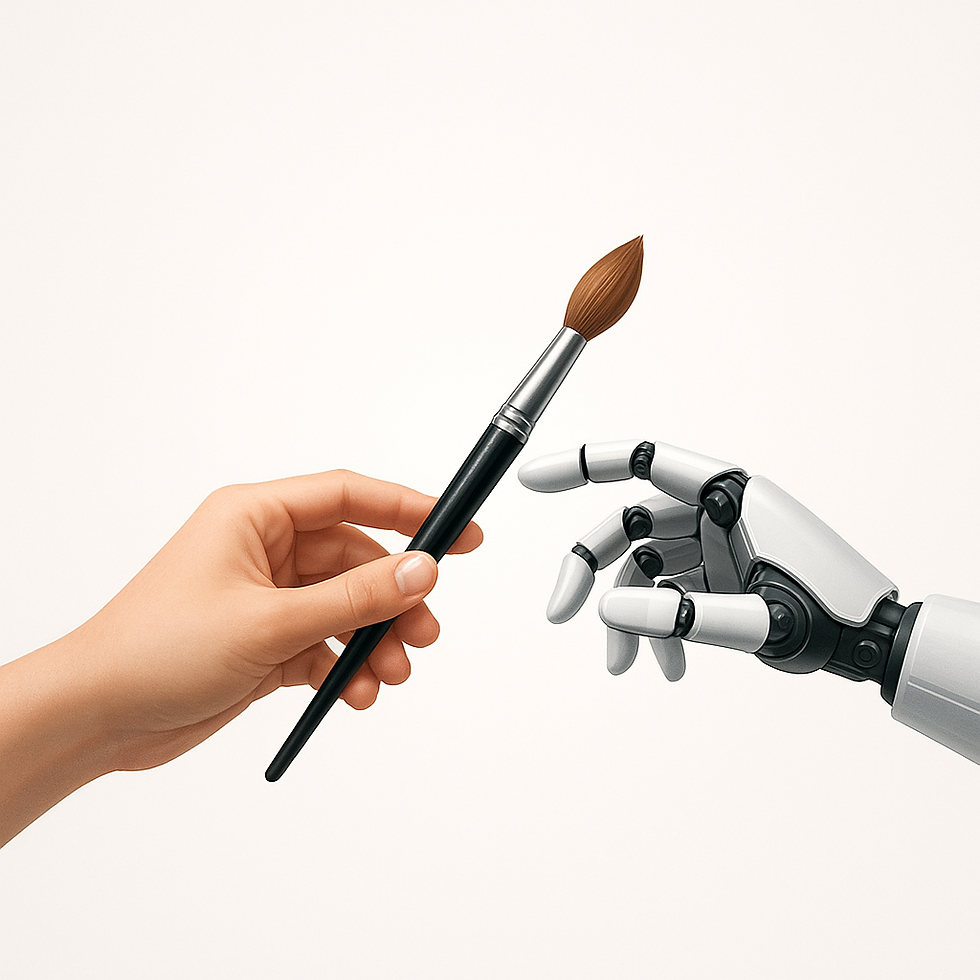AI is Here for Your Marketing Job. Now What?
- Jefrey Gomez
- Jul 29, 2025
- 3 min read
I was in a meeting last week where a junior copywriter showed our team an article she’d 'written' in about ten minutes using an AI tool. It was a decent 500-word blog post, complete with keywords. It wasn’t brilliant, but it was… fine.

And it sparked a nervous, honest conversation that’s happening in marketing departments everywhere: What parts of our jobs are we handing over to machines, and what happens next?
The panic around AI taking our jobs is understandable, but it’s often focused on the wrong things. The truth is, AI isn't coming for all marketing jobs. It's coming for the routine, the repetitive, and the predictable parts of our work. It’s a shift, not an apocalypse. And for those who are willing to adapt, it could lead to more interesting work than ever before.
The Automation Wave: Where the Ground is Shifting
Let’s be direct. Certain roles, especially those built on tasks that require scale over nuance, are already being reshaped by clever automation.
Mass Content Creation: The endless churn of basic SEO blog posts, the 20 slightly different product descriptions for an e-commerce site, the daily social media updates—AI is already good at this. Companies like CNET have experimented with AI-generated articles for factual reporting. This doesn't eliminate the need for skilled writers, but it does shrink the demand for purely foundational content farms. The premium is shifting from writing to editing, strategy, and voice.
Entry-Level Data Reporting: Tools like Looker Studio or Tableau’s AI features can now connect to your data, spot trends, and build a dashboard faster than a human ever could. The job of manually exporting spreadsheets and creating routine weekly reports is fading. The machine can now tell you what happened. The human job is to explain why it happened and decide what to do next.
Routine Outreach & Scheduling: AI-powered chatbots and automated schedulers can handle initial customer queries, qualify leads based on simple criteria, and manage social media posting calendars. The purely mechanical side of community management and sales development is becoming automated, freeing up humans to handle complex conversations and build genuine relationships.
The Human Edge: Where New Roles Are Appearing
While automation handles the grunt work, it creates a demand for new skills and elevates the importance of others. The future isn't fewer jobs; it's different, more strategic jobs.
The AI Whisperer (Prompt Engineer): Someone needs to guide the AI. This role is a blend of artist and scientist—someone who can write creative, precise prompts to get high-quality, on-brand output from AI tools. It’s about being the creative director for the machine.
The AI Ethics Guardian: As we use AI to target customers, big questions about bias, privacy, and fairness become urgent. A PR disaster caused by a biased algorithm is a real risk. Specialists who can ensure AI is used responsibly and ethically will become essential, acting as the conscience of the marketing department.
The Data Detective: With AI providing even more data, we need people who can find the story in the noise. The old job was running a report. The new job is asking the AI to sift through a year of customer behaviour to figure out why a specific group suddenly stopped buying, and then building a recovery strategy based on that hidden insight.
The Creative Director + AI Co-pilot: AI is becoming an incredible tool for brainstorming. Imagine a creative director feeding an AI the concept of ‘a summer soft drink campaign evoking 90s nostalgia’ and getting back 50 different visual mock-ups in minutes. This allows human creatives to refine the best ideas instead of starting from a blank page. Google's Performance Max campaigns already use this principle, with machine learning suggesting creative adjustments to improve performance.
The Customer Journey Architect: AI allows for personalisation at a scale never seen before. This creates a need for people who can design these complex, engaging, and seamless customer journeys across every touchpoint, from the first ad they see to the support email they receive a year after purchase.
The Real Question We Should Be Asking
The marketing and sales world of 2027 will look different, without a doubt. The question isn't "Will an AI take my job?" The real question is, "Am I willing to take on a more interesting one?"
The routine is being automated. The strategy, the creativity, the ethical judgement, and the empathy—that work is just beginning. And frankly, it’s a much better job anyway. The message is simple: get curious, learn the tools, and focus on doing the things that only a human can do.



Interesting read! While AI is transforming the marketing landscape, building genuine human connections will always matter. Just like Delicious Food Company brings a personal touch to catering in Dublin, marketers can blend technology with authenticity to create experiences that truly resonate.
Ask ChatGPT